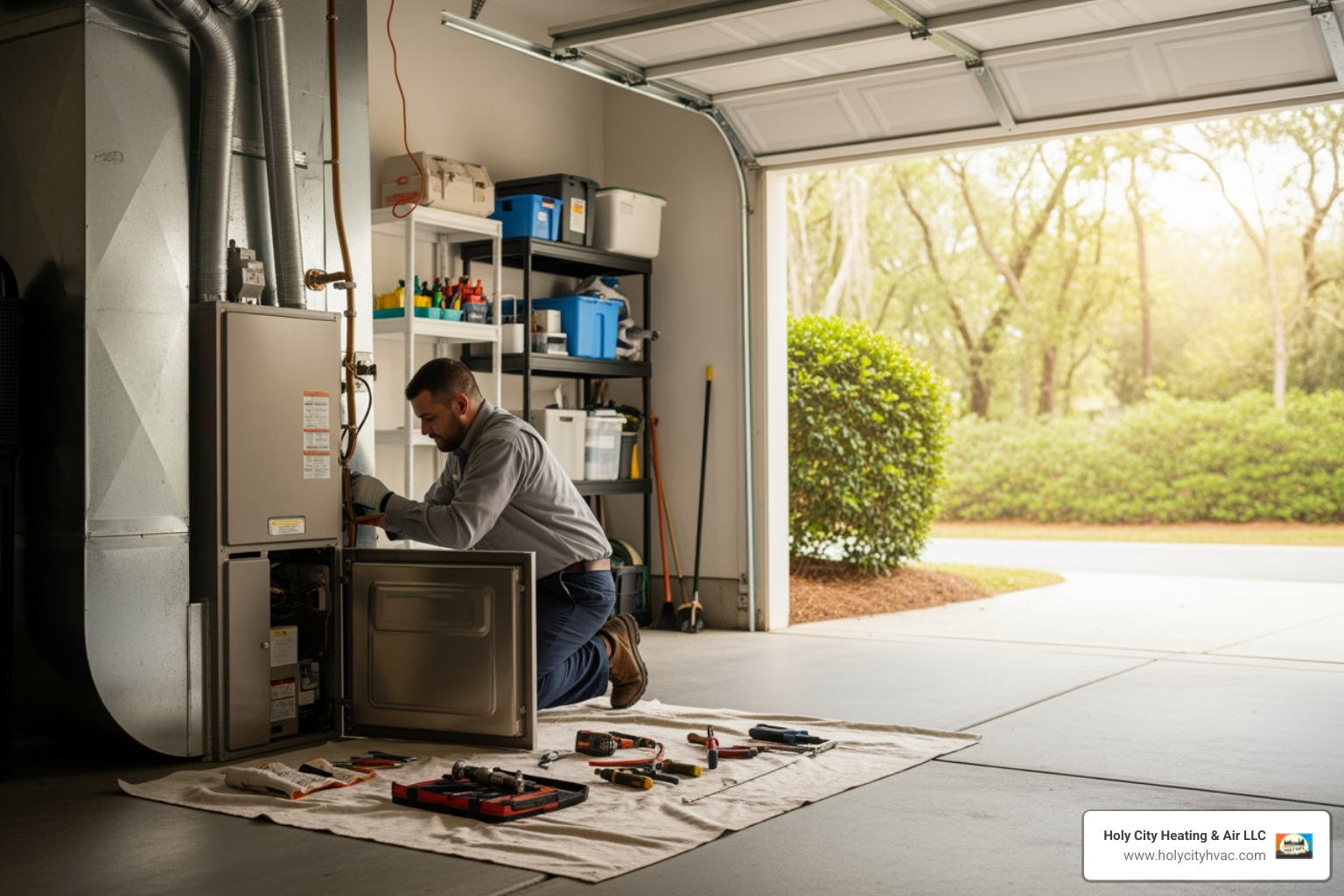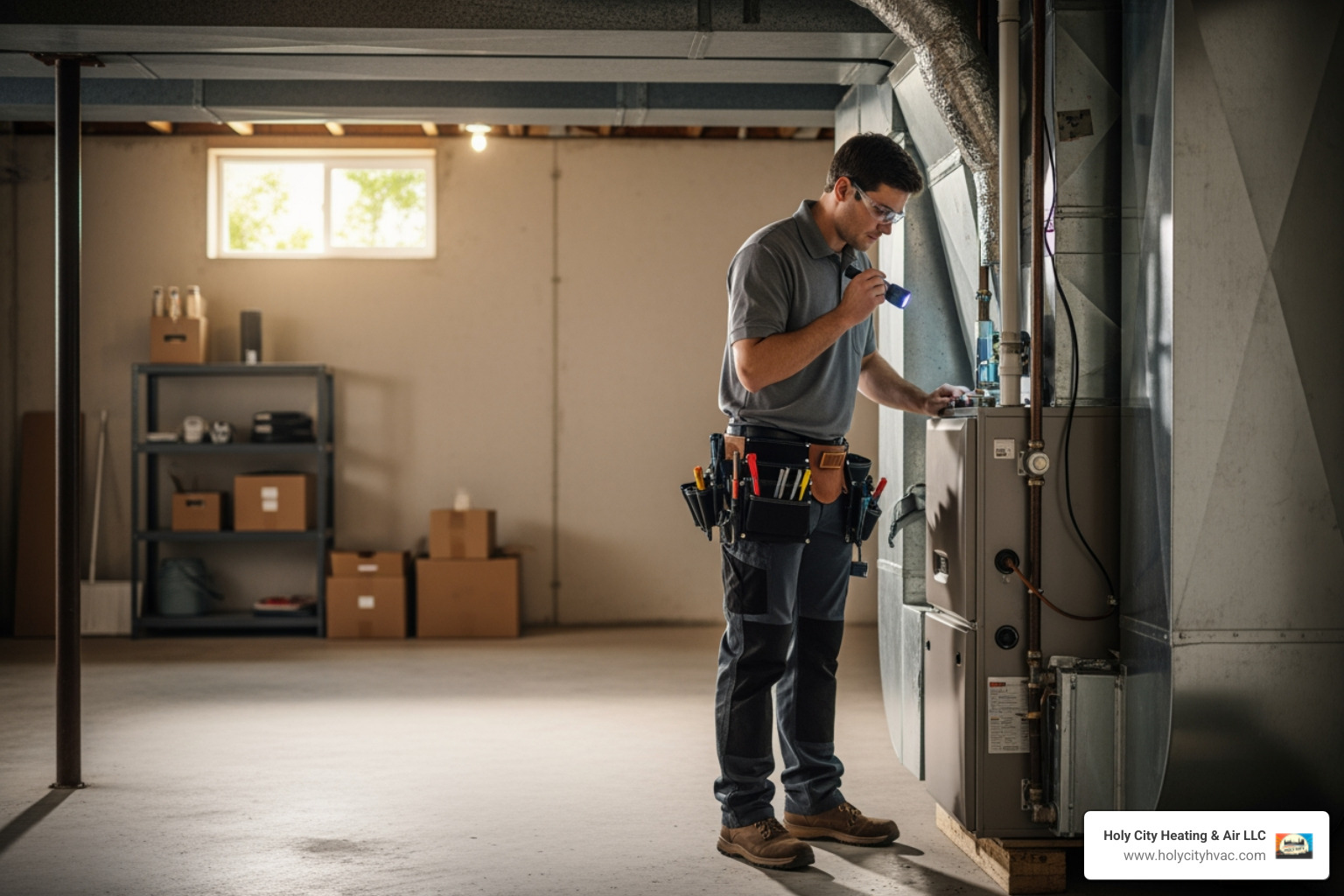
Why Understanding Heater Repair Costs Matters for Charleston Homeowners
The cost to fix heater in house typically ranges from $132 to $501, with an average repair bill of $317. However, major repairs can reach $3,000 or more depending on the component that fails.
Quick Cost Overview:
- Service call fee: $50-$200
- Labor rates: $75-$150 per hour
- Minor repairs: $100-$400 (thermostat, ignitor, flame sensor)
- Major repairs: $400-$3,000+ (blower motor, heat exchanger, control board)
- Emergency service: 2-3x normal rates
When your heater breaks down on a cold Charleston morning, panic often sets in. You're facing uncomfortable temperatures and the unknown expense of getting your system fixed. As one homeowner finded, what seemed like a major furnace failure requiring thousands in repairs turned out to be just a faulty door switch - a $200 fix that could have been an $8,000 replacement if they hadn't sought a second opinion.
Understanding repair costs helps you:
- Budget for unexpected breakdowns
- Avoid overpaying for simple fixes
- Make smart repair vs. replacement decisions
- Recognize when you need emergency service
The truth is, heater repair costs vary wildly based on what's actually broken. A dirty flame sensor might cost a couple of hundred dollars to clean, while a cracked heat exchanger could mean replacing your entire system. Knowing these differences empowers you to ask the right questions and make informed decisions about your home's comfort.
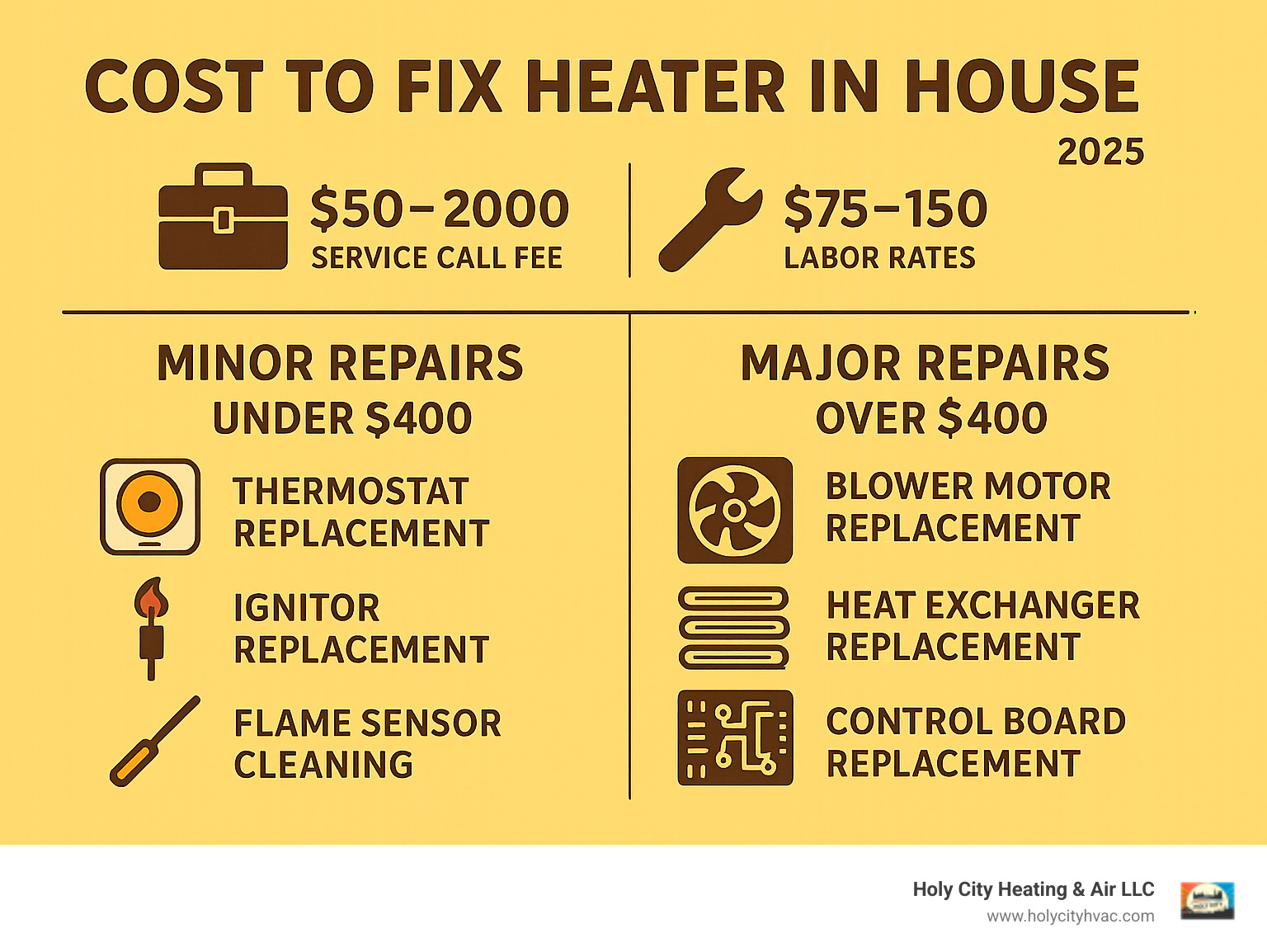
What Determines Your Final Heater Repair Bill?
When your heating system fails, the final cost to fix heater in house is influenced by several key factors. The type of furnace you have (gas or electric), its age and condition, and whether it's still under warranty all play a significant role. Additionally, costs are affected by the timing of your service call—emergency and after-hours repairs command higher rates. Your geographic location also matters, as labor rates for skilled technicians vary by region.
Key Factors That Determine the Cost to Fix Heater in House
Every repair bill consists of three main components: parts, labor, and a service fee.
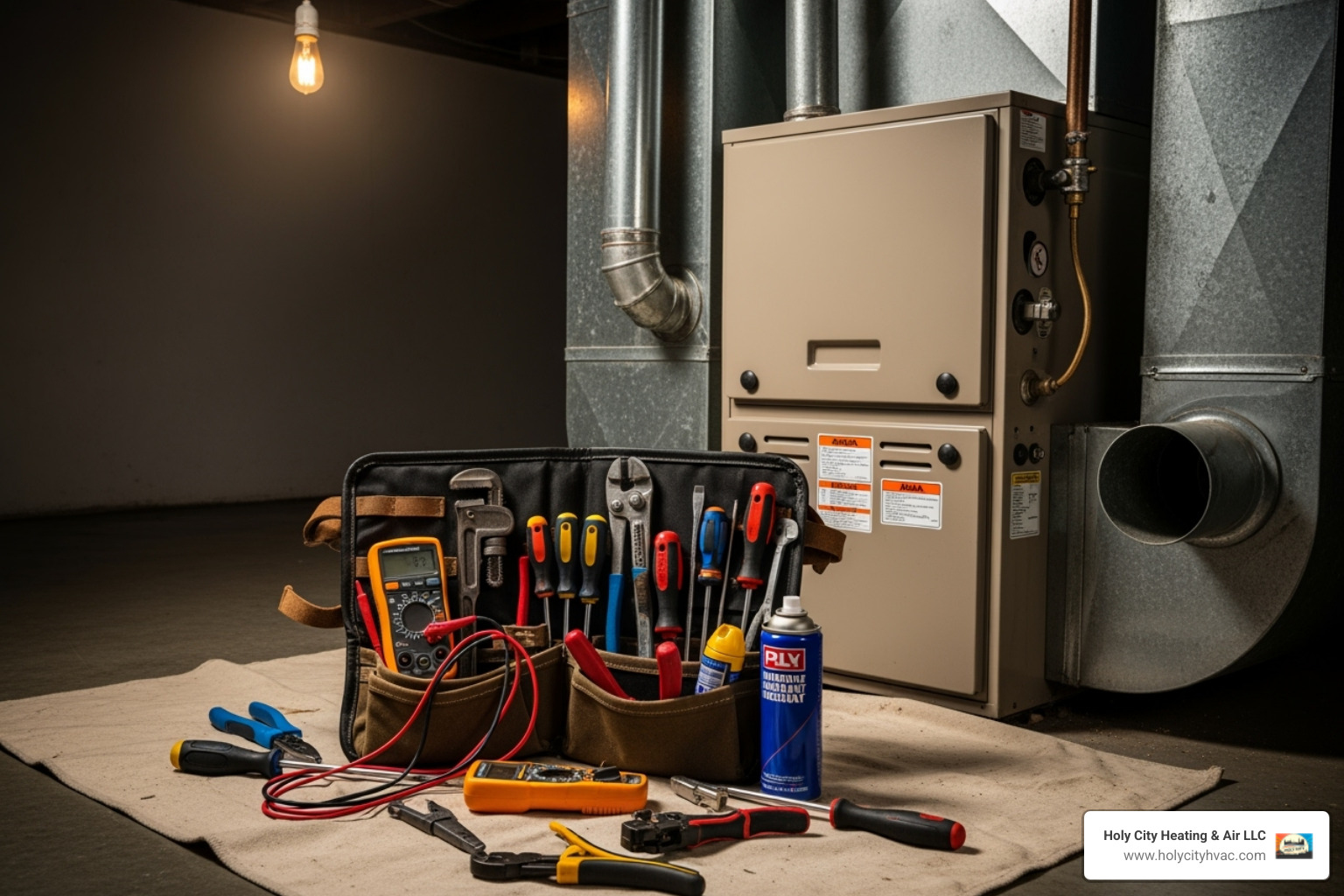
- Parts Cost: This varies widely, from an inexpensive filter to a heat exchanger that costs thousands. The price depends on the specific component, your furnace's make and model, and availability.
- Labor Cost: This covers the technician's time and expertise, usually charged at an hourly rate. Complex repairs take longer, increasing labor costs. Our EPA-certified technicians work efficiently to resolve issues quickly and correctly.
- Service Fee: This initial diagnostic fee covers the technician's travel and time to identify the problem. Most reputable companies, including ours, apply this fee to the total repair cost if you proceed with the work.
- Emergency Rates: Expect to pay double or triple the normal rates for service outside of standard business hours, on weekends, or on holidays. This premium ensures a skilled technician is available when you need one most.
Gas vs. Electric Furnace Repair Costs
Your furnace type significantly impacts repair costs due to differences in complexity.
- Gas Furnaces: These are more complex, involving a combustion process with more potential points of failure, such as ignitors, gas valves, and heat exchangers. This complexity can lead to more involved and costly repairs.
- Electric Furnaces: These are simpler, using electric heating elements (heat strips) to produce warmth. With fewer moving parts, there are fewer components that can break. Repairs often involve replacing heat strips or addressing control board issues, which can be less expensive than gas furnace repairs, though major electrical faults can still be costly.
Our technicians are experienced with both gas and electric systems, ensuring a fast and accurate diagnosis for any type of furnace.
The Impact of Warranties and Emergency Service
Warranties can significantly reduce your out-of-pocket expenses for heater repairs.
- Manufacturer Warranties: These typically cover the cost of replacement parts for 5-10 years, with some major components like heat exchangers having longer coverage. This can save you hundreds or thousands on parts.
- Labor Warranties: Offered by the HVAC company, this warranty covers the technician's workmanship for a specified period. Always inquire about the labor warranty terms for your repair.
Emergency service is available for urgent issues that occur after hours or on holidays. While the rates are higher, this service provides immediate assistance when you can't wait for regular business hours, ensuring your family's comfort and safety.
Breaking Down the Cost to Fix Heater in House: Common Repairs
The cost to fix heater in house depends entirely on which part has failed. Some repairs are minor and relatively inexpensive, while others are major and can be quite costly. Understanding the difference helps you prepare for the potential expense.
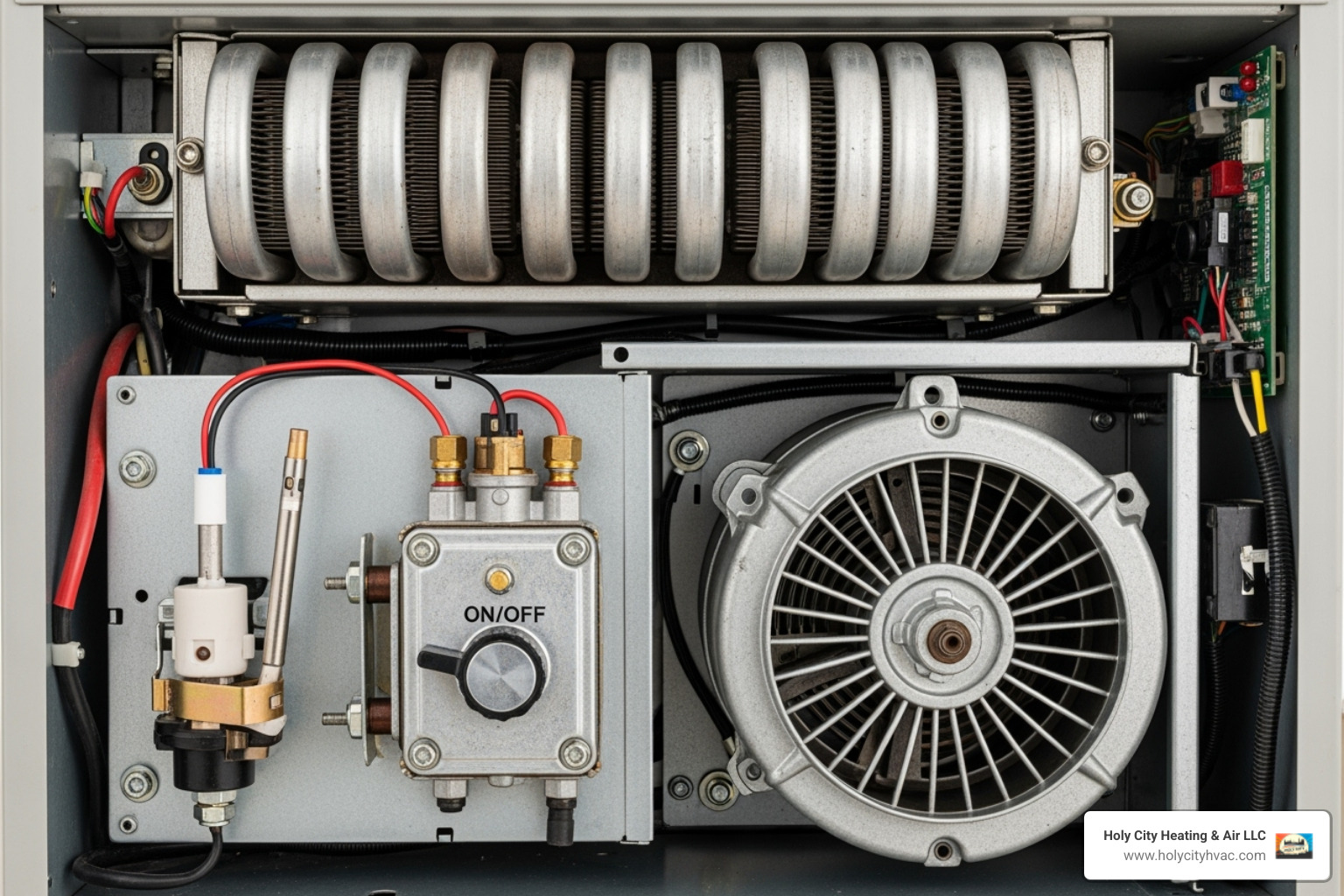
Many common furnace issues are minor, but major repairs require more significant financial planning. Here's a breakdown of what to expect.
Minor Repairs (Typically Under $400)
These common fixes are crucial for safe and efficient operation but won't break the bank.
- Thermostat Replacement: A faulty thermostat can cause numerous heating issues. Replacing it can range from installing a basic model to a smart unit that improves efficiency.
- Ignitor Replacement: This component lights the gas in your furnace and wears out over time. A replacement is a straightforward job for a professional.
- Flame Sensor Cleaning/Replacement: This safety device confirms a flame is present. If it gets dirty, it can shut your furnace down. Cleaning or replacing it is an affordable fix.
- Limit Switch Replacement: This switch prevents your furnace from overheating. Replacing a faulty one is a minor repair that is essential for safety.
- Furnace Filter Replacement: A clogged filter restricts airflow and can lead to bigger problems. While a DIY task, we often replace them during service calls.
- Transformer Replacement: This part provides low-voltage power to the furnace's controls. Replacement requires electrical expertise but is considered a minor repair.
Major Repairs (Often $400+)
Major repairs are more complex and expensive, often leading to a discussion about replacing the unit versus repairing it.
- Blower Motor Replacement: This motor circulates heated air. Replacement costs vary depending on the motor type and system complexity.
- Heat Exchanger Replacement: This critical component separates combustion gases from your breathing air. A crack is a serious carbon monoxide hazard, and replacement is so costly that a new furnace is often the better choice, especially on older units.
- Control Board Replacement: As the furnace's "brain," a malfunctioning control board can cause erratic behavior. Replacement is a significant investment.
- Draft Inducer Motor Replacement: This motor safely vents combustion gases outside. A failure will shut the furnace down for safety reasons, and replacement is a substantial repair.
- Gas Valve Replacement: This part controls the flow of fuel. A faulty valve is a safety risk and requires specialized knowledge to replace.
- Evaporator Coil Replacement: Though part of the AC system, a leaking coil affects both heating and cooling. This is a major repair that may prompt consideration of a full system upgrade.
For older systems, a major repair often signals that it's time to consider replacement. Our team helps Charleston homeowners make the most cost-effective decision for their home comfort.
Repair or Replace? Making the Smart Financial Decision
Deciding whether to repair or replace your heater is a major financial decision. While the cost to fix heater in house is an immediate concern, it's important to consider the long-term picture. Most furnaces have a lifespan of 15-20 years. As they age, they become less efficient and more prone to breakdowns.
Key signs that point toward replacement include frequent repairs, rising energy bills, and major safety issues. A cracked heat exchanger, for example, poses a dangerous carbon monoxide risk, making replacement a necessity, not just a choice.
The 50/50 Rule and the '$5,000 Rule'
Two simple guidelines can help you make an informed decision:
- The 50/50 Rule: If a repair costs more than 50% of the price of a new furnace, replacement is generally the more sensible option.
- The '$5,000 Rule': Multiply the age of your furnace by the estimated repair cost. If the total is $5,000 or more, it's likely time to replace it. (Example: A 12-year-old furnace with a $500 repair equals 6,000, suggesting replacement).
These rules don't account for the long-term savings from a modern, high-efficiency unit, which can significantly lower your monthly utility bills.
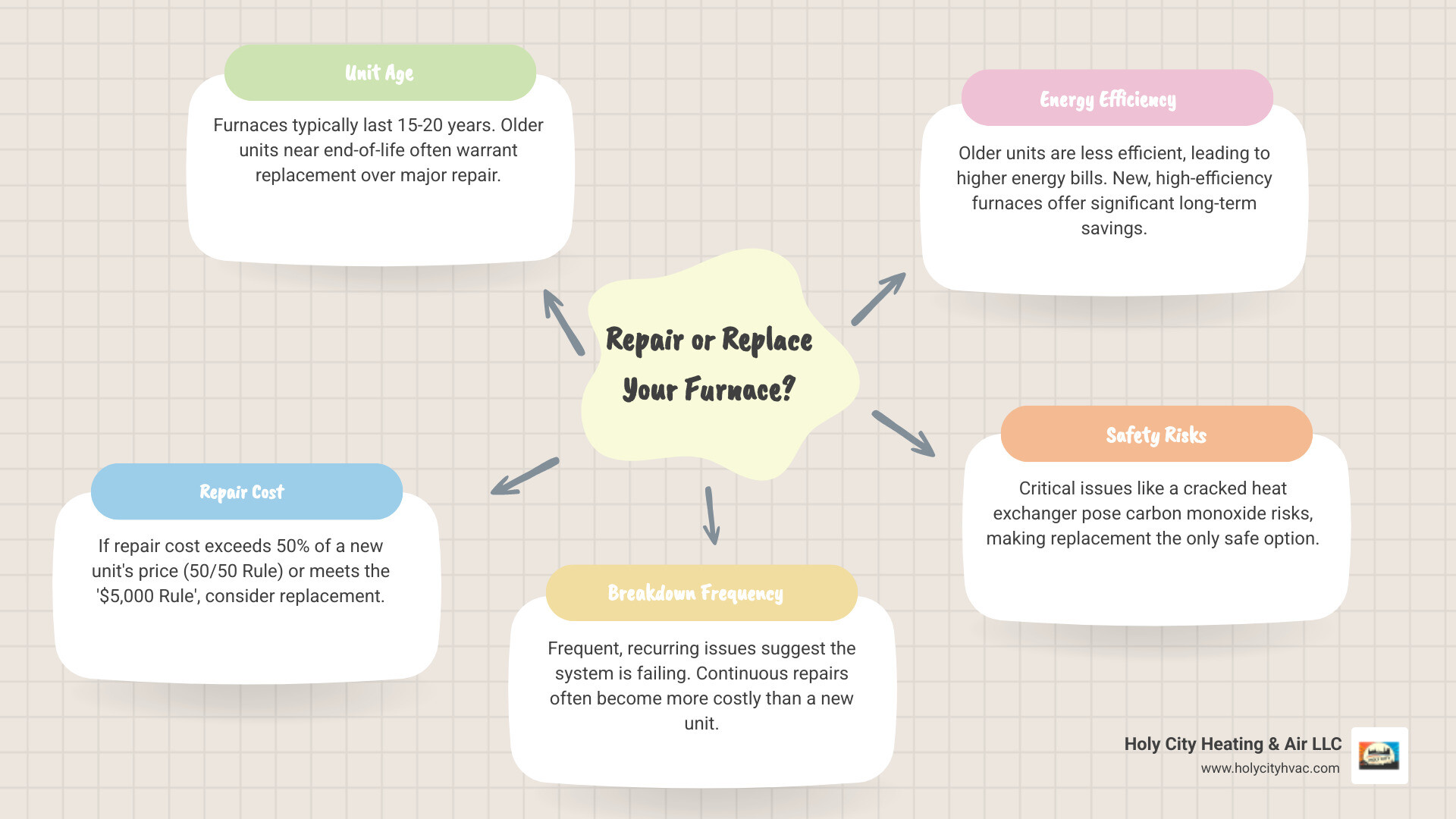
When Replacement is the Only Sensible Option
In some cases, the decision is clear-cut. Replacement becomes necessary under these circumstances:
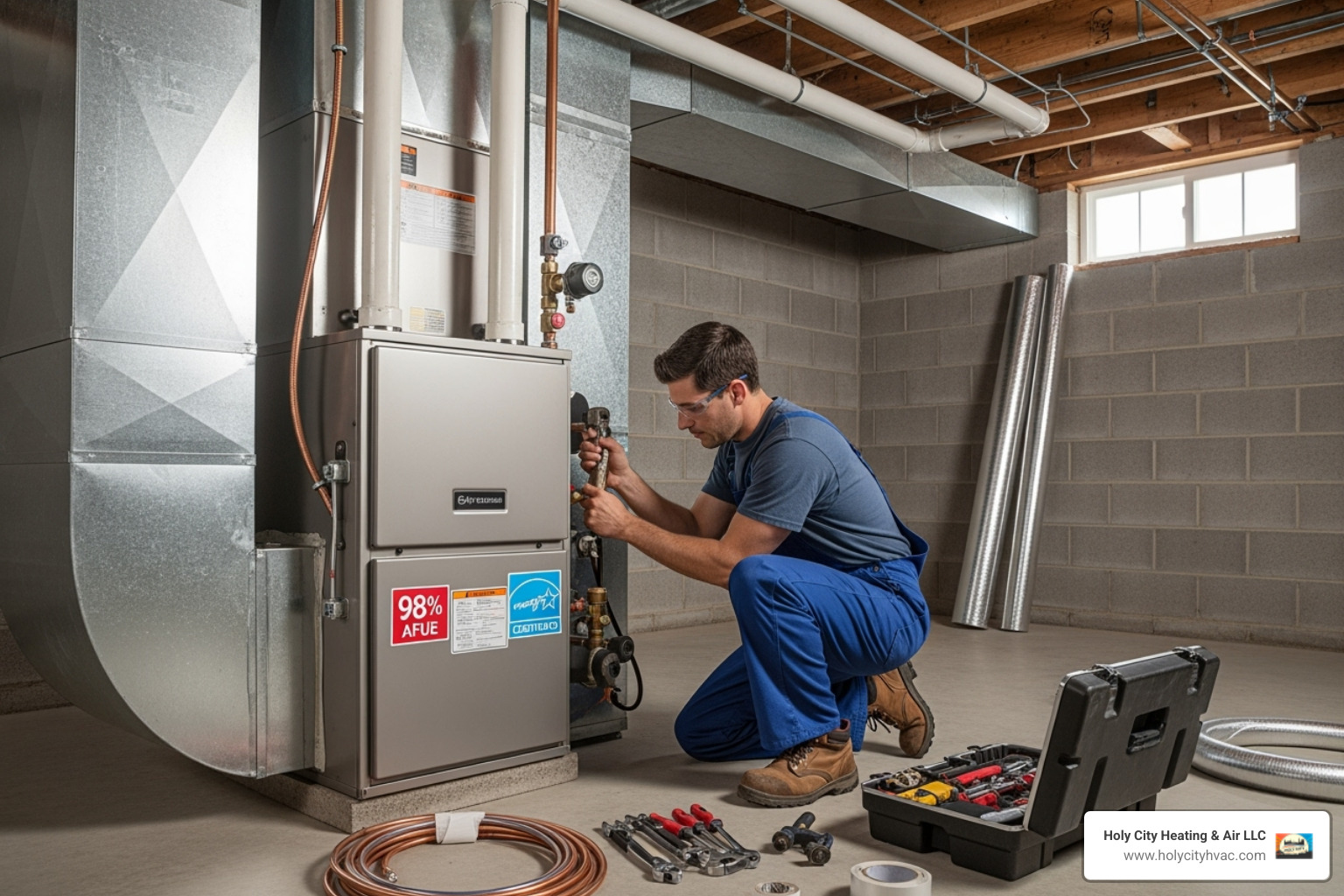
- Obsolete Parts: Manufacturers eventually stop producing parts for older models. If a necessary component is no longer available, replacement is your only option.
- Major Component Failure: A cracked heat exchanger is a critical safety failure that requires immediate furnace replacement to prevent carbon monoxide exposure.
- Other Safety Risks: Persistent gas leaks, major electrical faults, or other issues that compromise safe operation mean the unit must be replaced.
- Poor Efficiency: If your energy bills are steadily climbing, your old furnace is likely the cause. Investing in a new, high-efficiency ENERGY STAR model can lead to substantial savings on heating costs. More on energy-efficient furnaces highlights these advancements.
Proactive Maintenance: Your Best Defense Against High Repair Costs
Just like a car, your furnace requires regular maintenance to run reliably and efficiently. Skipping this crucial step often leads to unexpected breakdowns and expensive emergency repairs. Annual tune-ups are your best defense against high repair costs, preventing minor issues from becoming major problems.
Investing in preventative care helps you avoid the stress and expense of a heater failure during a Charleston cold snap. Customers who schedule regular maintenance experience fewer breakdowns and enjoy lower energy bills.
The Value of an Annual Furnace Tune-Up
An annual tune-up is a cost-effective investment that pays for itself in efficiency and longevity. During a comprehensive inspection, our EPA-certified technicians will:
- Clean critical components like the blower motor and heat exchanger to improve performance.
- Check and tighten all electrical connections to prevent fire hazards and ensure reliability.
- Lubricate all moving parts to reduce wear and tear and extend their lifespan.
- Test all safety controls to protect your family from dangers like carbon monoxide leaks.
A well-maintained furnace not only prevents breakdowns but also runs more efficiently, saving you money on your monthly energy bills.
DIY vs. Professional: Managing the Cost to Fix Heater in House
While some basic maintenance is great for homeowners to perform, most repairs should be left to professionals to avoid safety risks and costly mistakes.
- Safe DIY Tasks: You can and should change your furnace filter regularly, keep the area around the unit clear of clutter, and check your thermostat batteries. These simple steps are vital for your system's health.
- Leave to Professionals: Any work involving gas lines, high-voltage electricity, or internal components requires a licensed technician. Attempting these repairs yourself can lead to gas leaks, carbon monoxide exposure, fires, and voided warranties.
Our licensed, EPA-certified technicians have the training, tools, and expertise to diagnose and fix problems safely and correctly the first time. Professional service is the smartest choice for extending your furnace's lifespan and ensuring your family's safety.
Frequently Asked Questions about Heater Repair Costs
When your heater fails, you likely have questions about the cost. Here are answers to some of the most common inquiries we receive from Charleston homeowners.
How much is a typical HVAC service call fee?
A service call fee, or diagnostic fee, covers the technician's travel and time to diagnose the problem with your heater. This fee typically ranges from $50 to $200. At Holy City Heating & Air, we apply this fee toward the total repair cost if you choose to proceed with our recommended service, so it becomes part of your overall investment.
Is it worth fixing a 15-year-old furnace?
It depends on the repair. For a minor, inexpensive fix like a new flame sensor, repairing it is often worthwhile. However, for a major, costly repair like a heat exchanger or blower motor, that money is usually better invested in a new, more efficient furnace. A 15-year-old unit is nearing the end of its typical lifespan, so a large investment may not be financially sound.
Can I perform furnace repairs myself to save money?
While you can save money and prevent problems with simple DIY tasks like changing your furnace filter, most repairs should be left to a professional. Attempting to work on gas lines, electrical components, or internal parts is extremely dangerous and can lead to gas leaks, fires, or carbon monoxide exposure. It can also void your warranty. For your safety, always hire a licensed, EPA-certified technician for furnace repairs.
Stay Warm and Worry-Free with Expert Help
Understanding the cost to fix heater in house empowers you to make smart decisions for your home and budget. From minor fixes to the major choice between repair and replacement, knowledge helps you steer the unexpected. Heating repairs are a part of homeownership, but you don't have to face them unprepared.
At Holy City Heating & Air, we've been serving Charleston and surrounding communities like Kiawah Island, Mt Pleasant, and Summerville since 2015. As a family-owned business with over 20 years of expertise, we know that trust is essential. Our EPA-certified, licensed professionals provide peace of mind with every service call, backed by comprehensive Daikin warranties and our commitment to exceptional service.
We combine the resources of a leading company with the personal care of a local neighbor. When your heater fails, you need a team you can count on for honest advice and expert work. We're here to provide straight answers and treat your home with the respect it deserves.
Don't wait for a breakdown to disrupt your comfort. Whether you need a tune-up, a repair, or advice on a new system, we're ready to help.
Recent posts






